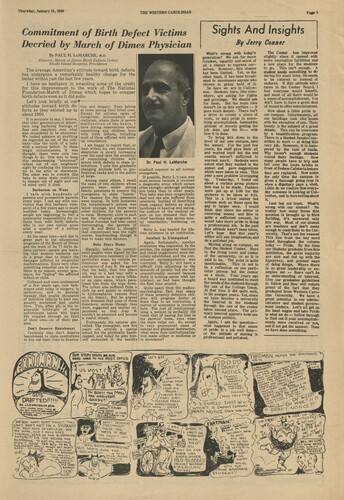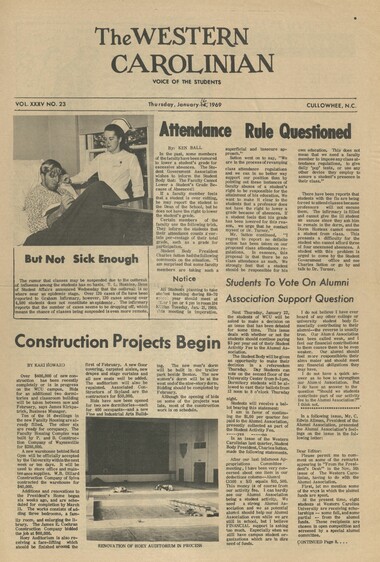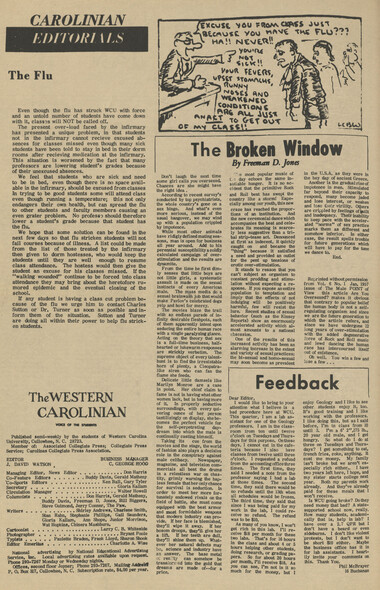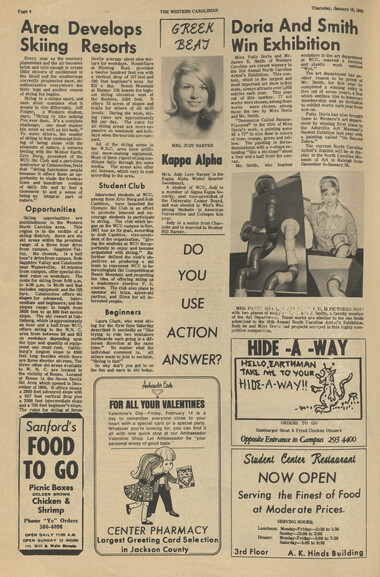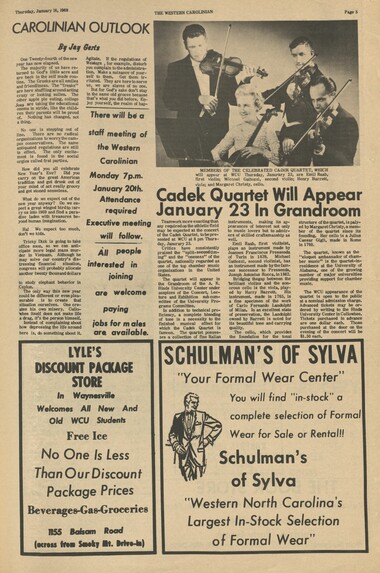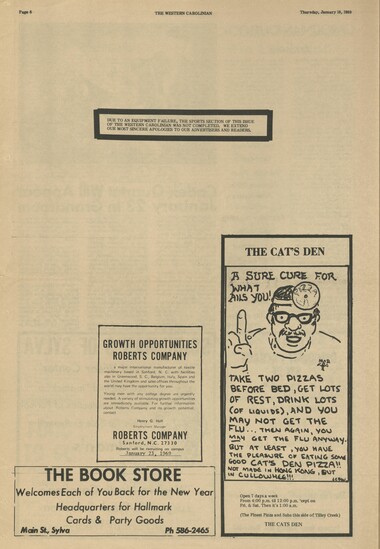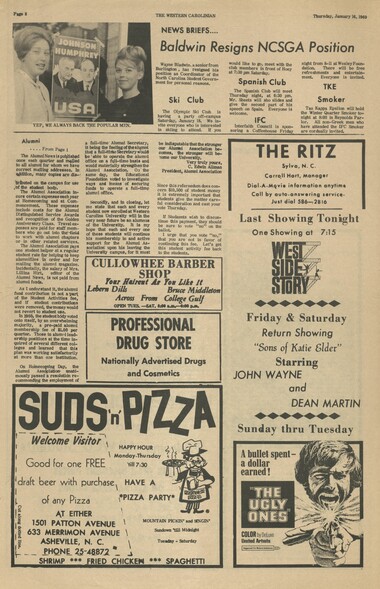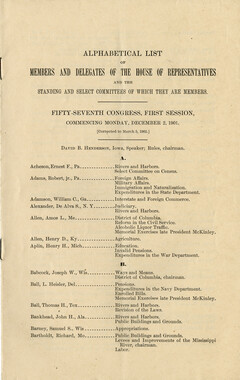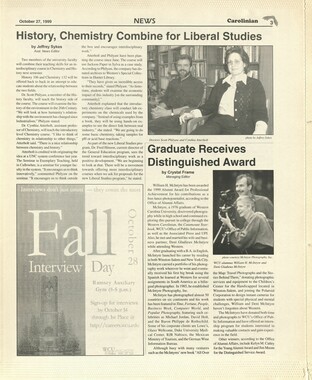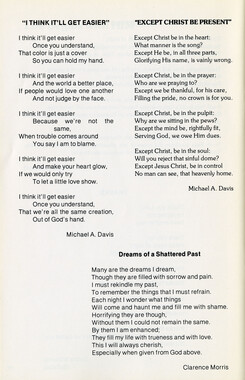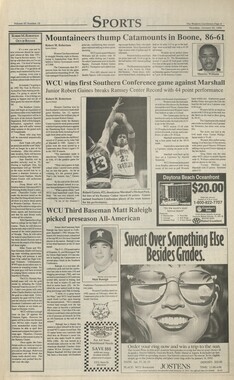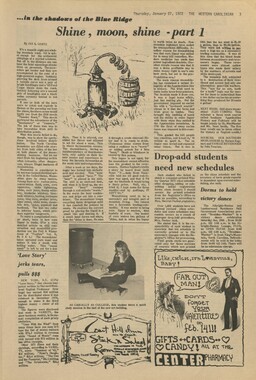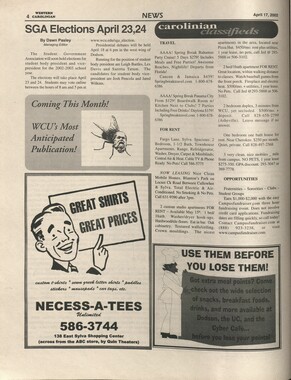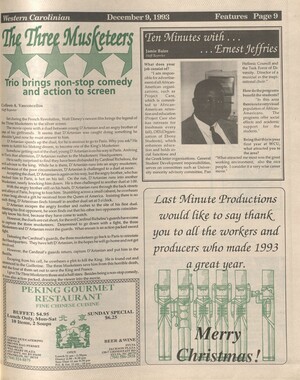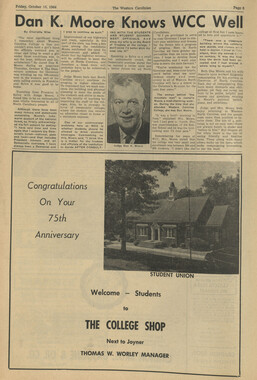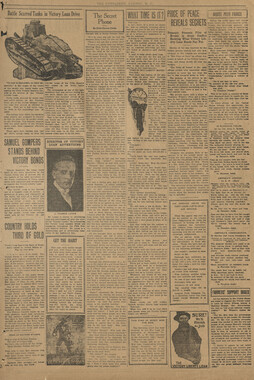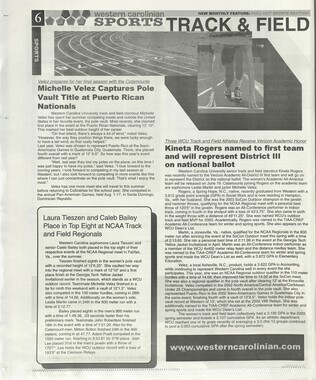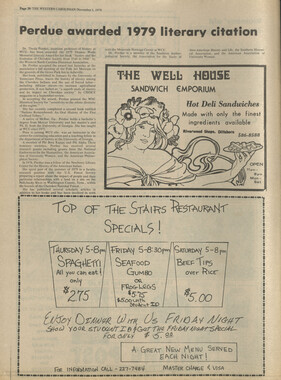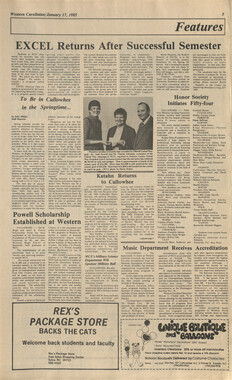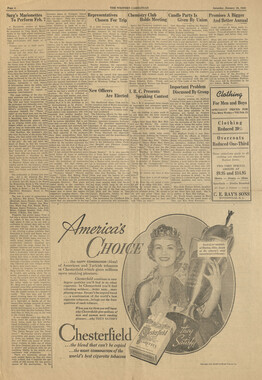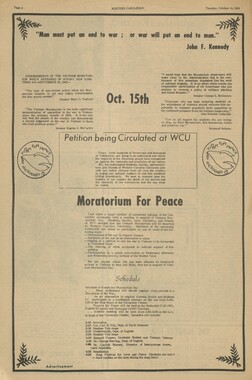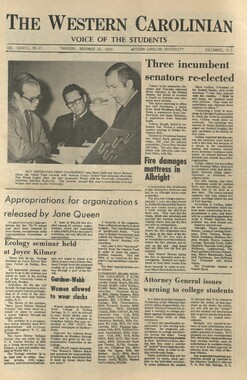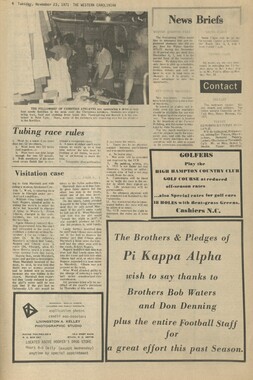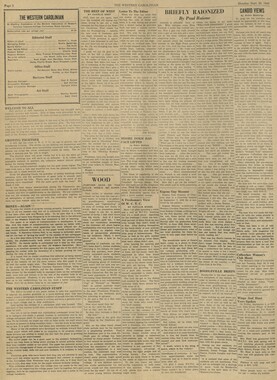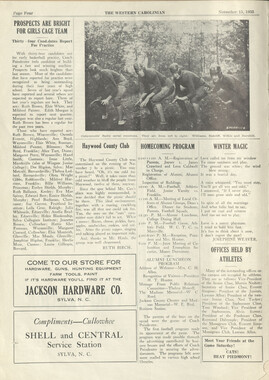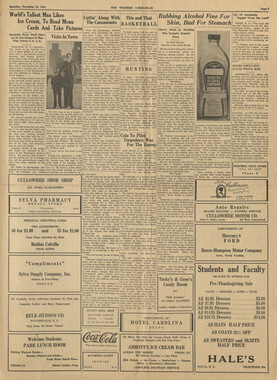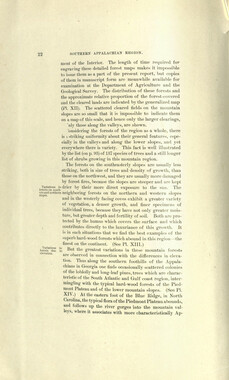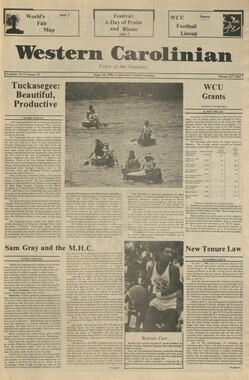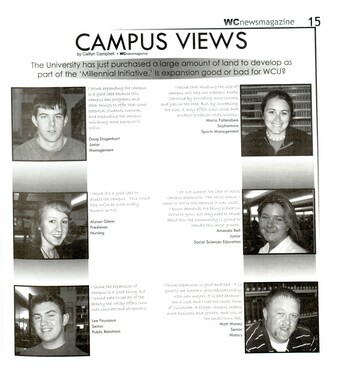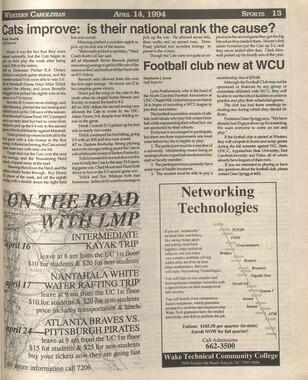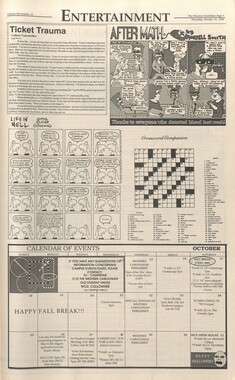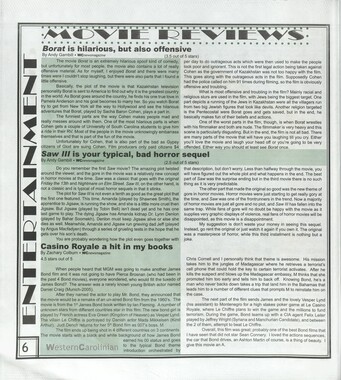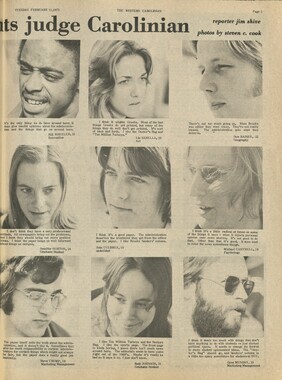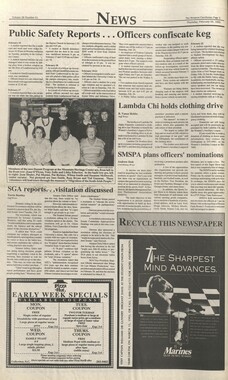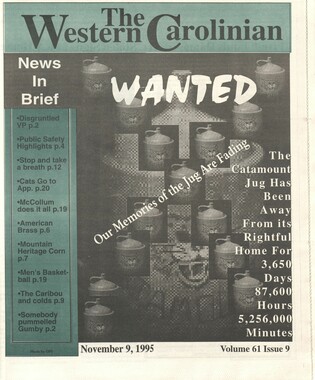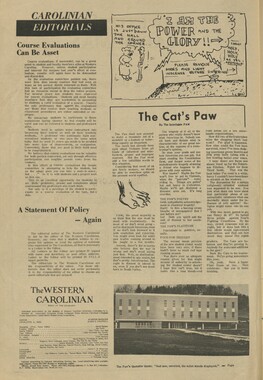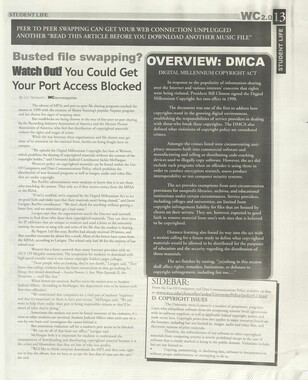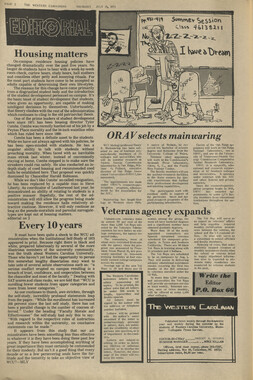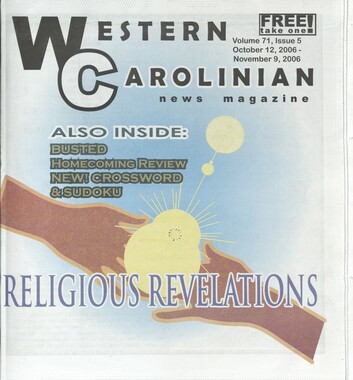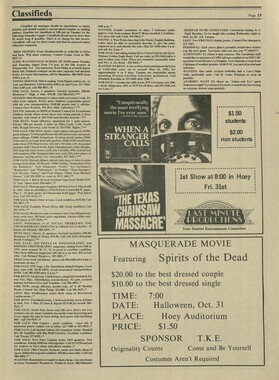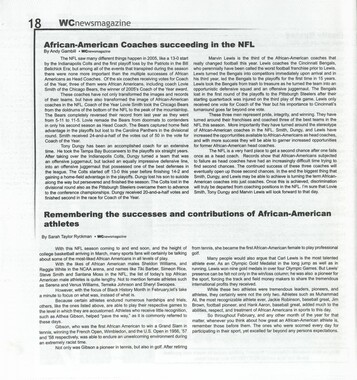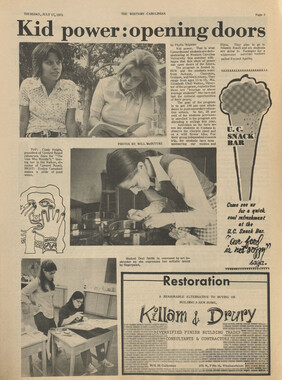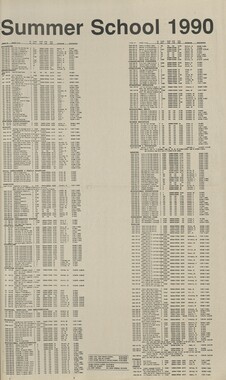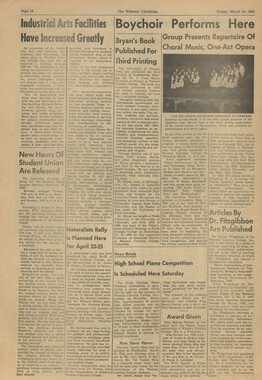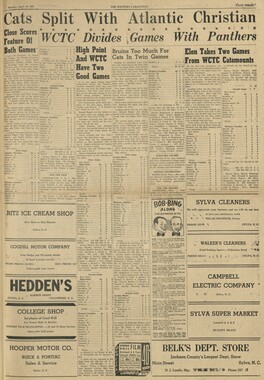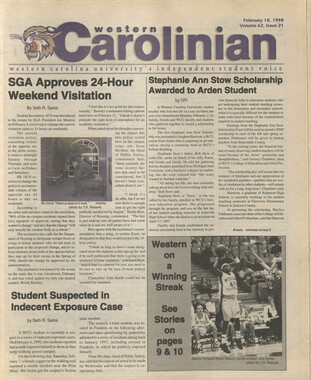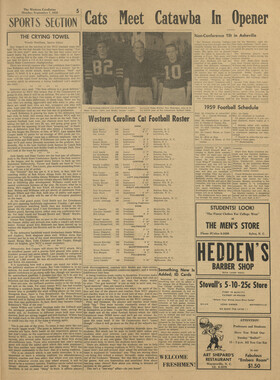Western Carolina University (21)
View all
- Canton Champion Fibre Company (2308)
- Cherokee Traditions (291)
- Civil War in Southern Appalachia (165)
- Craft Revival (1942)
- George Masa Collection (137)
- Great Smoky Mountains - A Park for America (3080)
- Highlights from Western Carolina University (422)
- Horace Kephart (998)
- Journeys Through Jackson (159)
- LGBTQIA+ Archive of Jackson County (89)
- Oral Histories of Western North Carolina (318)
- Picturing Appalachia (6617)
- Stories of Mountain Folk (413)
- Travel Western North Carolina (153)
- Western Carolina University Fine Art Museum Vitreograph Collection (129)
- Western Carolina University Herbarium (92)
- Western Carolina University: Making Memories (738)
- Western Carolina University Publications (2491)
- Western Carolina University Restricted Electronic Theses and Dissertations (146)
- Western North Carolina Regional Maps (71)
- World War II in Southern Appalachia (131)
University of North Carolina Asheville (6)
View all
- Allanstand Cottage Industries (62)
- Appalachian National Park Association (53)
- Bennett, Kelly, 1890-1974 (1463)
- Berry, Walter (76)
- Brasstown Carvers (40)
- Carver, George Washington, 1864?-1943 (26)
- Cathey, Joseph, 1803-1874 (1)
- Champion Fibre Company (233)
- Champion Paper and Fibre Company (297)
- Cherokee Indian Fair Association (16)
- Cherokee Language Program (22)
- Crowe, Amanda (40)
- Edmonston, Thomas Benton, 1842-1907 (7)
- Ensley, A. L. (Abraham Lincoln), 1865-1948 (275)
- Fromer, Irving Rhodes, 1913-1994 (70)
- George Butz (BFS 1907) (46)
- Goodrich, Frances Louisa (120)
- Grant, George Alexander, 1891-1964 (96)
- Heard, Marian Gladys (60)
- Kephart, Calvin, 1883-1969 (15)
- Kephart, Horace, 1862-1931 (313)
- Kephart, Laura, 1862-1954 (91)
- Laney, Gideon Thomas, 1889-1976 (439)
- Masa, George, 1881-1933 (61)
- McElhinney, William Julian, 1896-1953 (44)
- Niggli, Josephina, 1910-1983 (10)
- North Carolina Park Commission (105)
- Osborne, Kezia Stradley (9)
- Owens, Samuel Robert, 1918-1995 (11)
- Penland Weavers and Potters (36)
- Roberts, Vivienne (15)
- Roth, Albert, 1890-1974 (142)
- Schenck, Carl Alwin, 1868-1955 (1)
- Sherrill's Photography Studio (2565)
- Southern Highland Handicraft Guild (127)
- Southern Highlanders, Inc. (71)
- Stalcup, Jesse Bryson (46)
- Stearns, I. K. (213)
- Thompson, James Edward, 1880-1976 (226)
- United States. Indian Arts and Crafts Board (130)
- USFS (683)
- Vance, Zebulon Baird, 1830-1894 (1)
- Weaver, Zebulon, 1872-1948 (58)
- Western Carolina College (230)
- Western Carolina Teachers College (282)
- Western Carolina University (2008)
- Western Carolina University. Mountain Heritage Center (18)
- Whitman, Walt, 1819-1892 (10)
- Wilburn, Hiram Coleman, 1880-1967 (73)
- Williams, Isadora (3)
- Cain, Doreyl Ammons (0)
- Crittenden, Lorraine (0)
- Rhodes, Judy (0)
- Smith, Edward Clark (0)
- Appalachian Region, Southern (3032)
- Asheville (N.C.) (1945)
- Avery County (N.C.) (26)
- Blount County (Tenn.) (195)
- Buncombe County (N.C.) (1680)
- Cherokee County (N.C.) (283)
- Clay County (N.C.) (556)
- Graham County (N.C.) (238)
- Great Smoky Mountains National Park (N.C. and Tenn.) (535)
- Haywood County (N.C.) (3573)
- Henderson County (N.C.) (70)
- Jackson County (N.C.) (4925)
- Knox County (Tenn.) (35)
- Knoxville (Tenn.) (13)
- Lake Santeetlah (N.C.) (10)
- Macon County (N.C.) (421)
- Madison County (N.C.) (216)
- McDowell County (N.C.) (39)
- Mitchell County (N.C.) (135)
- Polk County (N.C.) (35)
- Qualla Boundary (982)
- Rutherford County (N.C.) (78)
- Swain County (N.C.) (2185)
- Transylvania County (N.C.) (270)
- Watauga County (N.C.) (12)
- Waynesville (N.C.) (86)
- Yancey County (N.C.) (72)
- Aerial Photographs (3)
- Aerial Views (60)
- Albums (books) (4)
- Articles (1)
- Artifacts (object Genre) (228)
- Bibliographies (1)
- Biography (general Genre) (2)
- Cards (information Artifacts) (38)
- Clippings (information Artifacts) (193)
- Copybooks (instructional Materials) (3)
- Crafts (art Genres) (622)
- Depictions (visual Works) (21)
- Design Drawings (1)
- Digital Moving Image Formats (2)
- Drawings (visual Works) (185)
- Envelopes (115)
- Exhibitions (events) (1)
- Facsimiles (reproductions) (1)
- Fiction (general Genre) (4)
- Financial Records (12)
- Fliers (printed Matter) (67)
- Glass Plate Negatives (381)
- Guidebooks (2)
- Internegatives (10)
- Interviews (823)
- Land Surveys (102)
- Letters (correspondence) (1070)
- Manuscripts (documents) (618)
- Maps (documents) (177)
- Memorandums (25)
- Minutes (administrative Records) (59)
- Negatives (photographs) (6090)
- Newsletters (1290)
- Newspapers (2)
- Notebooks (8)
- Occupation Currency (1)
- Paintings (visual Works) (1)
- Pen And Ink Drawings (1)
- Periodicals (194)
- Personal Narratives (10)
- Photographs (12977)
- Plans (maps) (1)
- Poetry (6)
- Portraits (4568)
- Postcards (329)
- Programs (documents) (181)
- Publications (documents) (2444)
- Questionnaires (65)
- Relief Prints (26)
- Sayings (literary Genre) (1)
- Scrapbooks (282)
- Sheet Music (2)
- Slides (photographs) (402)
- Songs (musical Compositions) (2)
- Sound Recordings (802)
- Specimens (92)
- Speeches (documents) (18)
- Tintypes (photographs) (8)
- Transcripts (329)
- Text Messages (0)
- A.L. Ensley Collection (275)
- Appalachian Industrial School Records (7)
- Appalachian National Park Association Records (336)
- Axley-Meroney Collection (2)
- Bayard Wootten Photograph Collection (20)
- Bethel Rural Community Organization Collection (7)
- Blumer Collection (5)
- C.W. Slagle Collection (20)
- Canton Area Historical Museum (2110)
- Carlos C. Campbell Collection (462)
- Cataloochee History Project (64)
- Cherokee Studies Collection (4)
- Daisy Dame Photograph Album (5)
- Daniel Boone VI Collection (1)
- Doris Ulmann Photograph Collection (112)
- Elizabeth H. Lasley Collection (1)
- Elizabeth Woolworth Szold Fleharty Collection (4)
- Frank Fry Collection (95)
- George Masa Collection (173)
- Gideon Laney Collection (452)
- Hazel Scarborough Collection (2)
- Hiram C. Wilburn Papers (28)
- Historic Photographs Collection (236)
- Horace Kephart Collection (861)
- Humbard Collection (33)
- Hunter and Weaver Families Collection (1)
- I. D. Blumenthal Collection (4)
- Isadora Williams Collection (4)
- Jesse Bryson Stalcup Collection (47)
- Jim Thompson Collection (224)
- John B. Battle Collection (7)
- John C. Campbell Folk School Records (80)
- John Parris Collection (6)
- Judaculla Rock project (2)
- Kelly Bennett Collection (1482)
- Love Family Papers (11)
- Major Wiley Parris Civil War Letters (3)
- Map Collection (12)
- McFee-Misemer Civil War Letters (34)
- Mountain Heritage Center Collection (4)
- Norburn - Robertson - Thomson Families Collection (44)
- Pauline Hood Collection (7)
- Pre-Guild Collection (2)
- Qualla Arts and Crafts Mutual Collection (12)
- R.A. Romanes Collection (681)
- Rosser H. Taylor Collection (1)
- Samuel Robert Owens Collection (94)
- Sara Madison Collection (144)
- Sherrill Studio Photo Collection (2558)
- Smoky Mountains Hiking Club Collection (616)
- Stories of Mountain Folk - Radio Programs (374)
- The Reporter, Western Carolina University (510)
- Venoy and Elizabeth Reed Collection (16)
- WCU Gender and Sexuality Oral History Project (36)
- WCU Mountain Heritage Center Oral Histories (25)
- WCU Oral History Collection - Mountain People, Mountain Lives (71)
- WCU Students Newspapers Collection (1923)
- Western North Carolina Tomorrow Black Oral History Project (69)
- William Williams Stringfield Collection (2)
- Zebulon Weaver Collection (109)
- African Americans (390)
- Appalachian Trail (35)
- Artisans (521)
- Cherokee art (84)
- Cherokee artists -- North Carolina (10)
- Cherokee language (21)
- Cherokee pottery (101)
- Cherokee women (208)
- Church buildings (190)
- Civilian Conservation Corps (U.S.) (111)
- College student newspapers and periodicals (2012)
- Dams (108)
- Dance (1023)
- Education (222)
- Floods (63)
- Folk music (1015)
- Forced removal, 1813-1903 (2)
- Forest conservation (220)
- Forests and forestry (1198)
- Gender nonconformity (4)
- Great Smoky Mountains National Park (N.C. and Tenn.) (181)
- Hunting (47)
- Landscape photography (25)
- Logging (122)
- Maps (83)
- Mines and mineral resources (9)
- North Carolina -- Maps (18)
- Paper industry (38)
- Postcards (255)
- Pottery (135)
- Railroad trains (72)
- Rural electrification -- North Carolina, Western (3)
- School integration -- Southern States (2)
- Segregation -- North Carolina, Western (5)
- Slavery (5)
- Sports (452)
- Storytelling (243)
- Waterfalls -- Great Smoky Mountains (N.C. and Tenn.) (66)
- Weaving -- Appalachian Region, Southern (280)
- Wood-carving -- Appalachian Region, Southern (328)
- World War, 1939-1945 (174)
Western Carolinian Volume 34 Number 23
Item
Item’s are ‘child’ level descriptions to ‘parent’ objects, (e.g. one page of a whole book).
-
-
Thursday, January 16,1969 THE WESTERN CAROLINIAN Page 3 tion and despair. They belong at home among their loved ones: Except for extreme cases of mongolism, microcephaly and cretinism, where there is severe malfunction of the brain, I have strong reservations about committing any children born with birth defects, including most of those afflicted with mental retardation. I am happy to report that, at least within my own experience, skepticism is slowly increasing over the need (and the morality) of committing children with severe birth defects to state institutions. I note this gradually changing attitude both in professional ranks and in the public at large. Among many others, I recall the cases of two children whose parents were under strong family pressures to commit the youngsters to state "homes." The reasons for the pressures were typical. In both instances the breadwinner's income was below average, and there were other children for the parents to raise. Moreover, since in each case the original prognosis or medical forecast had been called discouraging, the parents of Joey B. and Betty L. thought that commitment was the right course, heartrending though it was to make this decision. Baby Stays Home Happily, before the commitment papers were signed by the two physicians necessary in that particular state, an outside pediatrician was asked for his evaluation of Joey B. He agreed that the baby, then two years old, was in a bad way with a defect known as a spina bifida, or an open spine, which paralyzed him from the hips down. The infant also suffered from a cleft lip and palate in addition to hydrocephalus (excess fluid on the brain). But he argued with firmness that none of these disorders, serious though they were, suggested any mental impairment or that Joey B. couldn't be educated and become a useful citizen. Fortunately his opinion prevailed. The youngster, now five years old, attends a special school for the physically handicapped, and today he gets himself embroiled in the healthy Commitment of Birth Defect Victims Decried by March of Dimes Physician By PAUL H. LaMARCHE, m.d. Director, March of Dimes Birth Defects Center Rhode Island Hospital, Providence The average American's attitude toward birth defects has undergone a remarkably healthy change for the better within just the last few years. I have no hesitancy in awarding some of the credit for this improvement to the work of The National Foundation-March of Dimes which hopes to conquer birth defects even as it did polio. Let's look briefly at our4 attitudes toward birth defects as they existed up to about 1960. It is accurate to say, I believe, that older generations of Americans long harbored feelings of fear and repulsion over what was considered to be abnormal. We looked askance at anything we regarded as out of the ordinary—like the birth of a baby with a serious defect. In these tragic circumstances, it was thought, there were only two things to do. One was to keep this embarrassing "abnormal" infant out of our neighbors' sight by confining the blameless tot to the attic or elsewhere. The other was to commit this baby to some state institution to remain out of sight and out of mind until it died. Barbarism on Wane I talk with hundreds of parents and prospective parents every year. I can say with conviction that this barbaric viewpoint of a few years ago is much modified today. Increasingly, people are beginning to feel a community responsibility for infants born with birth defects, who in our own nation alone total a quarter of a million every year. At the same time—and due in great part to the educational programs of the March of Dimes and the work of its 77 birth defects centers—people are learning that modern medicine can do a great deal to repair the damages inflicted by congenital malformations. Since very often something remedial can be done, there is no reason, except ignorance, for "hiding" the afflicted infant or child. Unheard and even undreamed of a few years ago, new techniques exist today in surgery, in medication, and in physical therapy that enable thousands of defective infants to lead reasonably contented and useful lives. This, after all, is the inalienable birthright of those unfortunate babies who begin life crippled through no fault of their own—or of their parents. Don't Deserve Banishment Certainly they don't deserve banishment to state institutions to live out their lives in frustra- Sights And Insights Bif Jerri/ Conner Dr. Paul H. LaMarche mischief common to all normal youngsters. If possible, Betty L.'s case was more serious because it involved a diagnostic error which occurs often enough—although perhaps less today than in other years. This baby was born congenitally deaf and she also suffered from cataracts. Instead of describing these organic defects as major handicaps in hearing and seeing, the authors of the medical report on her stressed that her chief handicap was severe mental retardation, bordering on idiocy. Betty L. was headed for lifetime existence in an institution. Intellect Is Unimpaired Again, fortunately, another evaluation was requested. In the process, the congenital deafness and visual impairment were definitely established, and the commitment recommendation was overruled. Betty L. will have a difficult time adjusting to the demands of society, but she will unquestionably succeed because there is nothing amiss with her intellect, as had been thought the first time around. Quite apart from the medico- psychological fact that many of these severely defective children will progress faster at home than in an institution, a matter of economics is involved here. The cost of institutionalizing a patient is probably 100 times that of caring for him in his parents' home, even when the state helps out. So, except in very pronounced cases of mental and physical destruction, what sense does institutionalization make either in medicine or in economics? What's wrong with today's generation? We ask for more freedom, equality and worst of all a chance to express our- selves. However, this chance has been limited. Yet, on the other hand, it has been broadened to encompass anyone who chosen to grasp hold of It So here we are In Cullowhee. Students here, like elsewhere, are asking for rights and privilege. We should ask for them. But the main Idea doesn't lie on this surface — it goes much deeper. There isn't a drive to create a piece of work, or take pride in something accomplished. Instead the attitude of merely getting the job done and the H— with how it is done. To bring this down to the level of our own campus, take the annual. For the past few years, the staff gave their all and worked hard but the end results weren't sufficient to warrant merit Students were asked what they wanted in the annual and gave suggestions which were taken in vain. This year a new problem Is cropping up. Yesterday, I found out about a certain group picture that was to be made. Posters were put up at 2:00 for the pictures to be taken at 4:15, This is a trlval matter but actions such as these open the gap to larger ones. I would think that since the editor is receiving money and this is quite a sufficient amount, he would take more pride in doing a professional job. In the past this attitude hasn't been taken. Let's hope that this year's editor will use Imagination, and do a polished job. Moving along on campus, we find the Student Center. Here is the living room and center of the university, or so it is said to be. The point is quite questionable. This is not to be a reflection on one particular person but the center as a whole. Four years ago a board was instituted to meet the needs of the students through the use of the College Union, At that time it did quite well, in its younger years. Yet, since we have become a university the interest in the students through the use of the center takes second place. The primary interest appears to be one of campus politics. Again, I ask the question— what happened to that sense of pride in a job well done— or the attitude of making it professional and polished. The Center has improved slightly since It opened with more recreation facilities and a new place for the students to go. This isn't enough. A student needs something to do during his slack time. He needs to be catered to Instead of endured. If this attitude were taken In the Center Board, I feel everyone would benefit, and most of all there would be a sense of accomplishment You don't have to have a great deal of money to offer entertainment How about a little pride in our campus. Unfortunately, all our buildings look like boxes with the exception of one. Their beauty is the subject of a great debate. This can be overcome by a beautification program. There is a Student Senate Committee to work ~ at doing this very job. However, it is hampered by the lack of funds. Why haven't enough students voiced their feelings. How many people have to trip and fall over the loose bricks in front of Dod8onCafeteriabefore they are replaced. How come the only time the campus is given a thorough going over is when a dignitary pays a visit Little do we realize that everyday someone is looking at Cullowhee, and in turn telling about it Last but not least What's wrong with our alumni? No matter how many times this question Is brought up in Bird Building, it's answered only this way. Most of our alumni are teachers and don't make enough to contribute to the University, That's not the reason! This lies from the hey word found throughout the column today — Pride. By the time our Students graduate from this institution, the great majority are sick and fed up with the hypocracy, and pointed ways of doing things. Where there is no great leadership or examples set — there cant be an understanding or interest Give our graduates guidelines to follow and they wiU return proud of the fact that they graduated from Western Carolina University. We have a great potential in our admin- istrators and student govern- ment leaders. Let's all get on the band wagon and take Pride in what we do — follow through to find out if your accomplishments were received or not, and if not get the answer. Then we have done something. 'OH'.'.QOD WtfolH SOB1.!' HOWL!" TH£y CrtrJ'T t)(?ftFT ME".1, m (\ 5TUDU0T11 «v? 8*tNJ GOIN TO c<=>ll^&e rat? Cmc^a }i' * * ™,9 VOOMG flo.0 , T"i"j happcm" I"** ONO« is' V»aMDor kT««r CXW fcOAR©1,1 SOS Soi3i %LM<
Object
Object’s are ‘parent’ level descriptions to ‘children’ items, (e.g. a book with pages).
-
The Western Carolinian is Western Carolina University’s student-run newspaper. The paper was published as the Cullowhee Yodel from 1924 to 1931 before changing its name to The Western Carolinian in 1933.
-

